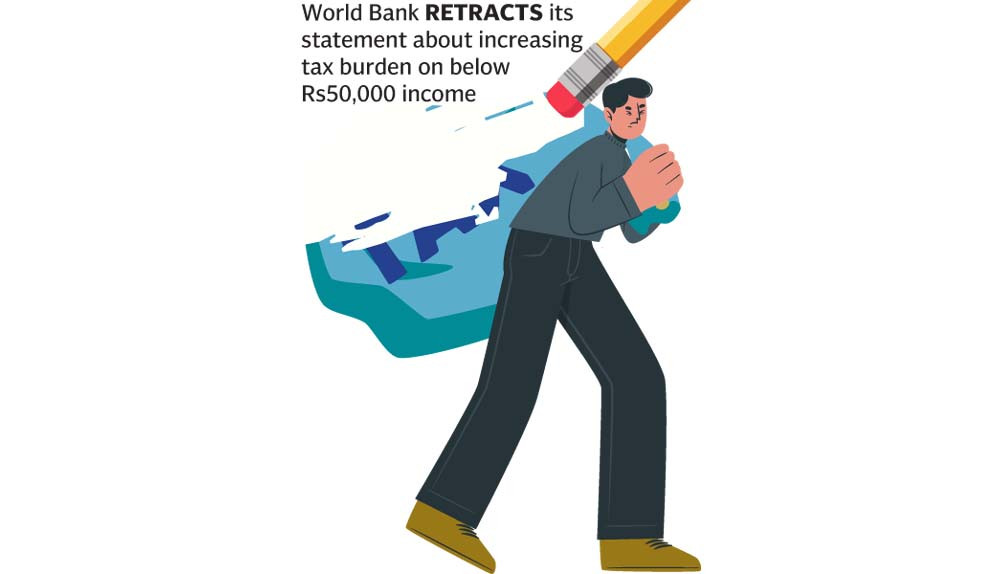World Bank retracts tax statement
Admits mistake as data shows salaried workers outpay richest sectors

The World Bank on Saturday retracted its recommendation regarding taxing monthly salaries below Rs50,000, as fresh data reveals that the highly marginalised salaried class again paid more taxes than the combined taxes paid by the richest exporters and the real-estate sector in the past three months.
Salaried individuals paid Rs70.6 billion in income tax during the July-September period of the current fiscal year, a sum larger than the combined contribution by the richest exporters and the influential and unregulated real estate sector, according to government statistics.
There is no match between the wealth and income of exporters and real-estate sector players in comparison to the marginalised salaried persons. The combined taxes paid by exporters and real-estate players were just Rs65 billion in three months, nearly Rs6 billion less than what was paid by salaried persons, many of whom come to the office on public transport or motorcycles.
WB retracts recommendation
The World Bank on Saturday clarified its position on the highly controversial recommendation of imposing taxes on incomes below Rs50,000 per month. The Washington-based lender stated that its recommendation was based on 2019 data, which needs to be updated in light of recent inflation and labour market conditions.
“The World Bank certainly does not recommend any reduction in the current nominal threshold, and how it was framed above may have indeed been misleading,” said a spokeswoman of the WB.
“Previous analysis included in the Public Expenditure Review using 2019 data suggested that a reformed income tax structure could include a lower exemption threshold for salaried individuals, but this analysis would need to be updated to take account of recent inflation and labour market changes to make sure low incomes are not affected,” according to the WB.
While accepting its mistake, the WB added that “the recommendation in the Pakistan Development Update should have been clearer on the need for new analysis needed on more recent data to inform this reform.”
The Express Tribune had reported this week that the WB recommended lowering the current income tax exemption threshold of Rs50,000 per month income.
The lender stated that the World Bank does not recommend any particular new level for income tax exemption and instead suggested conducting a fresh survey to gauge the level.
“Appropriate changes to tax thresholds should be assessed based on new survey data and designed to protect low incomes,” according to the WB.
The WB said it recommended comprehensive tax reforms that would make the overall system much more progressive than it is today, increasing the tax burden on the most well-off people. Reforms should include reducing subsidy expenditures, closing regressive tax exemptions, and increasing taxation of high-income earners, including via improved taxation of agriculture, property, and retail sectors, said the lender.
Most importantly, this reform should increase the progressivity of the system. Increased taxation should fall on the higher incomes, and reducing the nominal threshold today would not achieve that, according to the WB.
In the budget, the last Pakistan Democratic Movement (PDM) government further increased the tax burden for the salaried class, which also led to an additional burden of Rs17.7 billion in taxes on salaried people in just three months, revealed statistics of the government.
The salaried class paid 33% more income tax during the July-September period of the current fiscal year compared to the taxes paid in the same period of the last fiscal year.
Data compiled by the Federal Board of Revenue showed that during the July-September period, salaried persons paid Rs70.6 billion in taxes. The salaried people remained the fourth-largest contributors to withholding taxes after contractors, bank depositors, and importers.
In June’s budget, the government again increased taxes on salaried people earning more than Rs200,000 a month.
During the first quarter of this fiscal year, the FBR collected 580 billion on account of withholding taxes. The 12.2% of the total withholding taxes was paid just by the salaried class, which is not even allowed to adjust expenditures against their gross salary, showed the data.
Exporters who earned $7 billion or Rs2 trillion in the first quarter of this fiscal year paid a meagre sum of Rs21 billion in taxes. Their contribution in taxes was 21% higher than the preceding year, but it was lower than the increase in their income in rupee terms.
Exporters pay only 1% of their gross receipts in income tax. The income tax contribution of the exporters dropped from 4% to just 3.6% of the total withholding taxes in the current fiscal year.
The real-estate sector players paid Rs44 billion in taxes on sale and purchase of plots, which was up by Rs14.5 billion or nearly half after the government slightly increased their tax burden in the budget. Yet, the real estate sector’s contribution was not even near to what the salaried people paid in three months.

On the sale of plots, Rs20.6 billion was paid in taxes, up by Rs7.8 billion or 61%. On the purchase of plots, the tax contribution remained at Rs23.3 billion, higher by Rs6.8 billion or 41%.
The former finance minister had also revived his favourite tax collection tool in this year’s budget, the 0.6% withholding tax on cash withdrawal. The FBR collected Rs7.6 billion in taxes under this head in just three months.
The maximum amount of income tax collected was from contractors, saving account holders, importers, and salaried persons, electricity bills of the non-filers, telephone & mobile phones users, and dividend income, as shown by details compiled by the FBR.
At the rate of 0.5% advance tax on sales to retailers, the FBR pooled mere Rs4.4 billion from the retailers in the first quarter. It was probably the lowest contribution by any income group. The share of retailers and wholesalers in the total size of the economy was around 19%, but their share in total income tax was merely 0.7%.
Tax collection from contractors and service providers jumped by 35% to Rs106.3 billion in the first quarter. While this is the second single largest income tax collection head, the FBR does not have any role in it.
The collection on account of profit on debt jumped 42% to Rs113 billion in three months, the single largest contributor. The increase suggests the impact of higher interest rates and people’s tendency to save money. Banks charge 10% to 50% income tax rates on these savings accounts on behalf of the FBR.
Importers paid Rs89.5 billion in income tax on various types of imports, the third-largest contributor to withholding taxes.
There was a 75% increase in income tax collection through electricity bills due to the massive increase in electricity prices that pushed the bills above Rs25,000 per month level. The FBR collected Rs2.5 billion income tax through bills, up from Rs1.4 billion last year.
Published in The Express Tribune, October 8th, 2023.
Like Business on Facebook, follow @TribuneBiz on Twitter to stay informed and join in the conversation.


















COMMENTS
Comments are moderated and generally will be posted if they are on-topic and not abusive.
For more information, please see our Comments FAQ